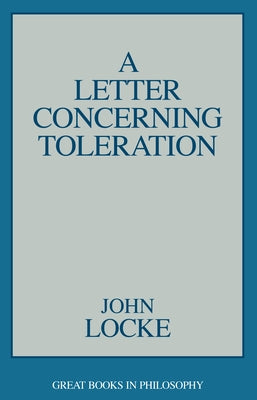1
/
of
1
Prometheus Books
A Letter Concerning Toleration
A Letter Concerning Toleration
Regular price
€13,95 EUR
Regular price
Sale price
€13,95 EUR
Shipping calculated at checkout.
Quantity
Couldn't load pickup availability
Ever since humankind raised its head toward the heavens in search of universal understanding and spiritual fulfillment, wars, pogroms, persecution, prejudice, and contempt have been the means of resolving the many and varied disagreements that have arisen over matters religious. In his Letter Concerning Toleration, Locke offers a compelling plea for freedom of conscience and religious expression. He outlines the limits of social and political incursion into the realm of personal belief or non-belief, discusses the dangers of mixing church and state, and strikes hard at those who would use the power of the state to fulfill religious or political goals. Rational persuasion is always to be encouraged in the hope that wayward souls may find a moral direction in life, but the use of force in such matters is unwarranted and unacceptable. Locke also addresses the question of denominational infighting and relations among the major religions. Talk of heresy and schism should be set aside in favor of understanding and cooperation to achieve mutually desirable social ends.
Author: John Locke
Publisher: Prometheus Books
Published: 05/01/1990
Pages: 82
Binding Type: Paperback
Weight: 0.27lbs
Size: 8.51h x 5.40w x 0.25d
ISBN: 9780879755980
Author: John Locke
Publisher: Prometheus Books
Published: 05/01/1990
Pages: 82
Binding Type: Paperback
Weight: 0.27lbs
Size: 8.51h x 5.40w x 0.25d
ISBN: 9780879755980
About the Author
JOHN LOCKE was born August 29, 1632, in Somerset, England, the son of landed English gentry. He entered Christ Church College of Oxford Univer-sity in 1652 and passed through the academic ranks quite uneventfully, later assuming a teaching post at the university. To escape ordination in the Church of England--a natural bureaucratic step toward university pro-motion--Locke took up the study of medicine and was transported into a new world of "natural philosophy" in which he associated with powerful scientific minds like that of Robert Boyle.
Share


